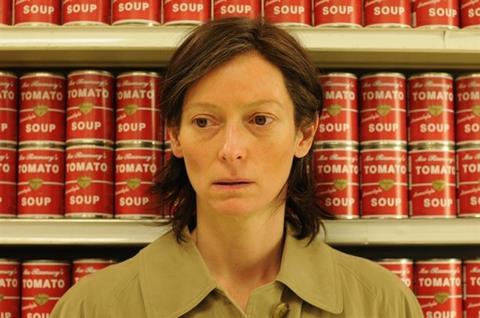Dir: Lynne Ramsay. UK. 2011. 110mins

A compulsively powerful adaptation of Lionel Shriver’s much acclaimed bestseller, Lynne Ramsay’s beautifully shot film about a mother and her relationship with the most problematic of children is an early strong entry to the Cannes competition and a film likely to receive positive critical attention. The strong cast and controversial storyline will boost distribution and further festival exposure is a given.
Lynne Ramsay displays a firm grip of the complex story.
The structure of Shriver’s original book is based on a series of letters as mother Eva Khatchadourian seeks to discuss her son Kevin with her husband Franklin, and attempts to come to terms with his terrible involvement in a high school massacre. Of course the delayed drama of the source story - and the terrible implications of Kevin’s actions - mean that the film’s structure is complex as it weaves through various points of Eva and Kevin’s life. And while the terrible truth of what Kevin does is a slow reveal in the book it has to be developed in a slightly different way in the film adaptation.
The film is very much seen through the haunted and tormented eyes of Eva (with Tilda Swinton giving a mesmerising performance) and how her life changes after giving birth to a troubled son, though the three young performers who play Kevin - Ezra Miller as the teen version, Jasper Newell as the boy and Rocky Duer as the toddler - are all quite astonishing as they consistently embody Kevin’s moody and dark sociopathic attitude.
The film is also distinctive through Seamus McGarvey’s luminous cinematography, the film’s striking colour palette and the artfully composed widescreen scenes. At times the song choices in the soundtrack are a little heavy handed, and the story does lag a little in the middle section, but We Need To Talk About Kevin remains an engrossingly tough film that really does deliver.
The film opens strikingly with an overhead shot of the packed streets when a packed crowd is taking part in a tomato festival - presumably La Tomatina in the Valencian town of Bunol - where participants throw tomatoes at each other. It is one of the few moments in the film where we see Eva with a smile on her face, rapt in her enjoyment of the spectacle.
From then onwards the film tracks several timelines - cross-cutting between her sad and bleak life after the incident at the school as she struggles to get a job and visiting Kevin in prison; brief moments of happiness as she and husband Franklin (Reilly) run drunkenly through the New York streets; her rush from work to the high school where there has been an ‘incident’, and various points in her life as Kevin is born and grows into a teenager.
It is clear from pregnancy that Eva is not at ease with the notion of being a mother. When Kevin is first born all he does is scream (in one perfect scene she parks his pram next to workmen drilling in the road in a bid to drown out his screams for a brief time) and as he grows from belligerent toddler to manipulative and brooding youth there are no points when mother and son really bond.
The arrival of a little sister Celia (Gerasimovich) does little to unite the family unit, despite Franklin’s consistent positive attitude, and as Kevin grows from surly youth to almost sociopathic teenager matters only get worse. Especially when his interest in Robin Hood leads to a dangerous enthusiasm for archery.
At the heart of the story is the rarely tackled issue of maternal ambivalence, and while that was the subject much debated in reviews of the source novel, in the film this sits alongside how Eva struggles to deal with the repercussions of Kevin’s actions and the very visual growth of Kevin from a devilish child who would put Damien into the shade through to cruelly intelligent teen. Tilda Swinton’s angular face perfectly suits the haunted Eva, and while the film lacks scenes of her and Franklin’s happier days (in fact the film only offers vague clues to her success as a travel writer and why the couple should have enough money to move to a mansion) its main focus is on the drama of the relationships
Lynne Ramsay, whose last film in Cannes was the much acclaimed Ratcatcher (1999), displays a firm grip of the complex story, using cleverly composed scenes of empty spaces of emphasise the sadness and disconnection between the characters. We Need To Talk About Kevin is a gripping film about tormented characters, with the beautifully shot final scenes never dwelling on the tragic killings that haunt the story.
Production companies: BBC Films, UKFC, Footprint Investments LLP, Piccadilly Pictures, LipSync Productions, Independent, Artina Films, Rockinghorse Films
International sales: Independent Film Sales, www,independentfilmcompany.com
Producers: Luc Roeg, Jennifer Fox, Robert Salerno
Executive producers: Michael Corso, Christopher Figg, James Gallimore, Paula Jalfon, Lisa Lambert, Christine Langan, Norman Merry, Andrew Orr, Lynne Ramsay, Michael Robinson, Steven Soderbergh, Tilda Swinton, Robert Whitehouse
Screenplay: Lynne Ramsay, Rory Stewart, based on the novel by Lionel Shriver
Cinematography: Seamus McGarvey
Editor: Joe Bini
Production designer: Judy Becker
Music: Jonny Greenwood
Main cast: Tilda Swinton, John C Reilly, Ezra Miller, Ashley Gerasimovich, Jasper Newell, Rocky Duer





















